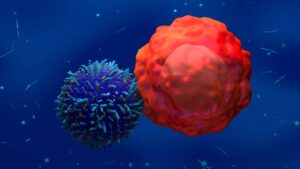‘Best place we’ve ever been’: AdAlta looks to monetise lead asset in 2024

AdAlta looks to monetise its lead asset AD-214 in 2024 after several wins in 2023. Pic: Getty Images
- AdAlta says it’s had several wins in 2023 on the path to monetising lead asset AD‑214
- Phase 1 extension clinical study reinforces safety profile and potential efficacy of 10 mg/kg dose
- AdAlta is now actively seeking a partner for progression of AD-214 into Phase 2 trial
Special Report: After a decade of dedicated development on a leading asset AdAlta stands as a clinical-stage biopharmaceutical development company at a crucial turning point.
AdAlta (ASX:1AD) CEO and managing director Tim Oldham says multiple opportunities are opening up for the company as it finishes 2023 in the “best place we’ve ever been”.
1AD’s planned Phase 2 trial of its lead asset AD-214 in Idiopathic Pulmonary Fibrosis (IPF) was recently boosted after its Phase 1 extension clinical study reinforced the safety profile and potential efficacy of the 10 mg/kg dose.
“For us 2024 will most definitely be transformational,” Oldham says.
“We aim to either out-licence AD-214, or otherwise project finance the Phase 2 program, which will unlock the value of that asset. “
He says number one priority is now completion of its Phase 1 extension trial, further de-risking the Phase 2 trial and supporting the partnering program.
“We have an additional dose which participants will receive that we’ve never given before and that will help better understand the body’s immune response to the drug, which is one of the key questions our potential licensing partners have been asking,” he says.
Overcoming challenges of traditional antibody therapy
Oldham says 1AD was founded on the back of its trademarked i-body platform to discover and develop next generation protein therapeutics.
He says an i-body is a unique human protein combining advantages of small molecules for size and stability and antibodies for high affinity and specificity creating new treatment options for certain illnesses.
“It’s a really tiny antibody-like molecule that can go places that traditional antibodies can’t to solve therapeutic challenges which have so far defeated antibody therapies,” he says.
1AD’s internal pipeline has a particular focus on a very important class of drug targets known as G protein-coupled receptors (GPCRs) that are targeted by around one third of all approved drugs.
With only two approved antibody drugs in this class, GPCR mediated diseases are clearly hard for antibodies to address and so a sweet spot for the 1AD i-bodies.
Today, 1AD’s GPCR targeted pipeline focusses on fibrotic and inflammatory disease and cancer.
“The first drug we developed using the i-body platform was AD-214, which started back in 2015 and since then we have invested around $45 million in developing that product to the end of Phase 1.”
“We’ve demonstrated that AD-214 has efficacy in multiple animal models of fibrosis with the strongest data being in lung and kidney fibrosis,” he says.
“Lung fibrosis is a US$4 billion annual market, chronic kidney disease is a $10 billion plus market every year.
“We are generating data on eye fibrosis as well which is a $16 billion annual market.”
Treatment for ‘death sentence’ disease
Oldham says IPF is a debilitating lung disease which ultimately leads to respiratory failure and fatality within three to five years of diagnosis. IPF has no known cause.
“It’s an orphan disease with around half a million patients around the world,” he says.
1AD has received orphan drug designation (ODD) from the US FDA, which provides a range of advantages for the company including new drug application fee waivers, a potentially faster route to market, additional years of exclusivity upon approval and tax advantages for commercialisation partners.
He says there are two marketed drugs for IPF today which sell globally for ~US$4.3 billion annually.
“They slow progression, but they can’t halt it which means sufferers still are, as one of our patients told us recently, ‘living under a death sentence’,” he says.
“The side effects of the drugs are also unpleasant which means many patients can’t tolerate them for more than a year.
“AD-214 is designed to halt progression of IPF with far fewer to no side effects so patients can tolerate using it for an extended period of time.”
First-in-class molecule
Oldham says AD-214 will be one of only three drugs going into Phase 2 trials for IPF targeting novel modes of action where there has not been another candidate fail.
“We could be one of only three first-in-class molecules and the only one to bring antibody like specificity to the table,” he says.
“Those three are the only ones targeting receptors where there’s been no prior clinical trial failures.”
Oldham says this demonstrates the power of the i-body platform.
“We have succeeded in getting an antibody-like molecule to address this particular disease, which is a pretty rare outcome,” he says.
2023 a year of wins
Oldham says 2023 has been a successful year for company.
“We knew the drug worked in animal models, and from our original Phase 1 study we understood its distribution and for how long it could block its target receptor,” he says.
“We also knew that to be commercially adopted we had to be able to give the drug intravenously no more frequently than every two weeks.
“What we didn’t know was whether the receptor occupancy we could achieve in two weeks was efficacious.
“This year we closed that gap, which was huge and de-risked our Phase 2 program.”
Oldham says 1AD has been able to simulate different doses to show that a commercially acceptable intravenous dosing regimen is likely to be effective.
“That was big win number one and win number two was that same work enabled us to predict that a subcutaneous form of the drug injected under the skin rather than intravenously might also be effective,” he says.
“That’s a big deal because it moves the drug from having to be administered in a hospital or clinic to something a patient can administer at home,” he says.
“It’s something big pharma have been asking us about for some time and to be able to give them confidence in this route of administration increases the attractiveness of the drug.”
He says 1AD’s third major achievement in 2023 was getting the Phase 1 extension study underway.
“We’re approaching the end of 2023 with renewed enthusiasm,” he says.
Partner momentum building
Oldham says 1AD is looking at partnership opportunities for AD-214 to progress to a Phase 2 trial.
“Given Phase 2 studies will cost around US$35 million, we need to partner at the end of Phase 1 to finance this, hence our efforts this year to make the asset as attractive as possible,” he says.
Oldham says 1AD has been in discussion with a wide range of companies who indicated they do deals at Phase 1 stage.
He says they’ve had enquiries from pharma companies wanting to licence the asset but also people interested in investing in the Phase 2 program.
“That opened up the possibility of project financing Phase 2 so we would retain partial ownership of the asset rather than just getting a royalty stream,” he says.
“Either way, we wouldn’t have to ask our shareholders to finance the trial.”
This article was developed in collaboration with AdAlta, a Stockhead advertiser at the time of publishing.
This article does not constitute financial product advice. You should consider obtaining independent advice before making any financial decisions.
Related Topics

UNLOCK INSIGHTS
Discover the untold stories of emerging ASX stocks.
Daily news and expert analysis, it's free to subscribe.
By proceeding, you confirm you understand that we handle personal information in accordance with our Privacy Policy.








